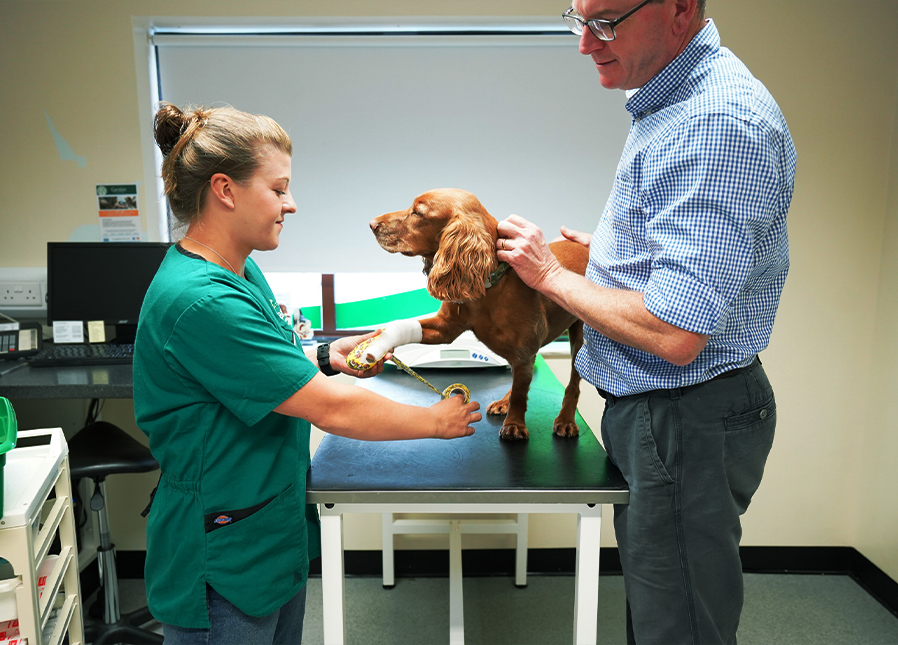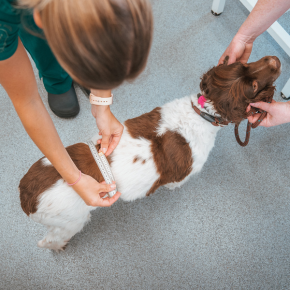
Obesity is one of the most common nutritional disorders in our pets today. Approximately 6 in 10 cats and dogs are overweight.
Just as in humans, weight gain most commonly occurs when there is an excess calorie intake that does not match the animal’s level of physical activity. Many things can contribute to weight gain including age, mobility, food type, and neuter status. It is important to recognise that although these factors increase the risk of weight gain, it is avoidable as long as we are aware of the presence of these risks.
What are the risks to my pet if they are overweight?
Animals who are overweight have a reduced life-expectancy and will have an increased risk of the following conditions:
- Arthritis
- Diabetes mellitus
- Heart disease
- High blood pressure
- Breathing difficulties and snoring
- Heat stress
- Pancreatitis
Many other significant conditions can be exacerbated by excess body weight, and animals that are overweight will have a significantly increased anaesthetic risk no matter what surgery they require.
How do I know if my pet is overweight?
Hopefully you will have already made you initial free weight clinic appointment with one of our nursing team. If you haven’t please do so as soon as possible. We have lots of experience with weight management are are here to give you as much advice and support as possible.
What can I do to prepare for the appointment?
- With the aid of our nurses we hope that you will soon start to see visible signs of weight loss in your pet. To do this we to start off on the correct foot. Please follow the next few steps so that your first appointment is effective as possible.
- Talk to all family members and other carers of your pet. You need to explain to them for health reasons your pet will begin a weight loss program. If everyone is on board at the start it should avoid frustration and confusion.
- Please complete a food diary for your pet for at least one week. Absolutely everything needs recording, from their normal daily meal, to every last table scrap or treat that they get given. Please be as honest as possible, as having a completely accurate record makes it easier for our Nurses to formulate a diet plan for your pet. Ensure you bring this with you to your appointment.
- Please either provide photos or bring your pet’s food packaging in with you to the appointment. Every food is formulated differently and the information on the back of the packet provides us with the nutritional information we need to devise a correct feed guide for your pet.
What happens at the initial consultation?
We do ask that you bring your pet along to all weight clinics.
During the free initial weight clinic:
- Your pet will be weighed and have various body measurements taken and recorded.
- The nurse will take several photographs of your dog for the records.
- The nurse will then spend time discussing your pet’s food diary and daily exercise regime with you.
- We will then discuss with you various options regarding diet and treats to allow us to tailor an individual and realistic diet and exercise plan for your pet.
- We will also provide your pet with their own weight management booklet to help support you through their weight loss experience.
At the end of the consultation our aim is to have helped you formulate a plan for your pets weight loss, diet changes, and exercise regime, we will also arrange an appointment for your pets next check.
We are offering 25% off all Royal Canin Weight Management Satiety diets in July, with a further 20% off for Wellness Plan members. Please click here or speak to a member of a team to find out more about our Weight Management Clinics and offers.
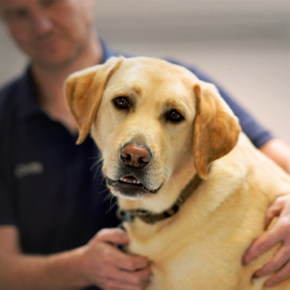
Spring is here, and for many of us, that means warmer Somerset & Wiltshire weather, blooming flowers, and spending more time outdoors with our furry companions. However, for dogs, spring can also mean the development or flare-up of allergies…
Dog allergy symptoms to be aware of
Did you know that dogs can be allergic to a variety of things just like humans, including tree and grass pollens, insect and flea bites, dust, and mould. These allergens can be particularly prevalent during the spring. Our veterinary team have put together a handy Dog Allergy Guide to help you get to know the symptoms of allergies to look out for.
Download our Dog Allergy Guide
Spring/summer environmental dog allergies [H3] Hay fever in dogs
Pollen allergies from trees, grass, flowers, and weeds can start in spring and last until autumn for some dogs. All dogs can suffer from pollen allergies (or hay fever) however, it seems to be more common in females and some breeds can be more prone to it, like Labrador Retrievers, Golden Retrievers, Dalmatians, and West Highland Terriers.
With airborne allergens, like pollen, dogs can have symptoms even when they’re nowhere near the source I.e., on the grass. Whereas some dogs may sneeze due to pollen allergies, there are many other more common symptoms to look out for – learn more here.
Mould allergies
Mould allergies can also affect dogs more when spring arrives, particularly in areas with high humidity; house mould should be dealt with as soon as possible.
Dust allergies
Dust allergies can lead to sneezing, breathing difficulties, and other common allergy symptoms
We’ve mentioned this as a ‘spring allergen’ as although it can occur at any time, ‘spring cleaning’ can disturb large amounts of dust and debris.
Flea bites
A whopping 95% of flea eggs, larvae and pupae live in the environment, not on pets. As the temperature warms up in spring, flea activity starts to ramp up. Some dogs are allergic to flea saliva and may have an immediate (within 15 minutes) or a delayed (24 – 48 hours) reaction that is most visible on the skin. If your dog has atopic dermatitis, they will be more prone to a flea saliva allergy.
Atopic dermatitis is a common condition that causes chronic itching, which leads to excessive scratching, biting or licking at the skin, resulting in inflammation of the skin and hair loss. This condition can be caused by an allergic reaction to environmental allergens, such as those above.
What to do if you think your dog is allergic?
If your dog is showing signs of allergies, it’s best to book an appointment with one of our vets. They can determine the cause of your dog’s symptoms and recommend an appropriate course of treatment. In some cases, they may recommend antihistamines or other medications to help control your dog’s symptoms. In more severe cases, they may also recommend an anti-allergy vaccination or topical medications to relieve the symptoms.
IMPORTANT: Never give your dog medication meant for humans, particularly antihistamines, without a vet’s explicit advice and dosage instructions. Some brands may contain harmful ingredients for pets and the dosage may not be the same as it is for humans. It’s also important to keep in mind that while spring is a common time for allergies to surface, dogs can develop allergies or have allergic reactions all year round.
Other reasons why your dog might be scratching
We think that it’s important to understand there may be other reasons for your dog’s scratching and irritation such as:
- Food intolerances
- Dry skin (from a lack of essential fatty acids in the diet, cold weather, or grooming products)
- Over-production of skin yeast or bacteria
- Skin infection
- Mites or lice
- A tick bite
- Behavioural issues such as anxiety or boredom
This is why knowing the other common symptoms of allergies and booking an allergy appointment for your dog is important. The sooner our team can investigate and diagnose, the sooner a treatment plan can be started and you dog’s daily life improved.

The Garston Vets’ Wellness Plans are designed to provide all your pet’s preventative healthcare needs for twelve months at a time. Each membership allows you to spread the cost of your pet’s annual preventative healthcare needs into twelve affordable monthly payments, as well as make further savings in other areas.
Our NEW Premium Wellness Plan includes UNLIMITED VETERINARY CONSULTATIONS and DISCOUNTED OUT OF HOURS FEES, giving dog and cat owners ultimate peace of mind.
All our Wellness Plans have been specifically designed so that your pet can receive bespoke preventative healthcare all year round with the cost to you spread over monthly payments. The plans incorporate annual vaccinations, anti-parasite medications, and a whole range of additional inclusions & savings to allow your pet to remain in tip-top shape.
Our team will work with you to ensure every aspect of your pet’s healthcare is appropriate and tailored to their age & lifestyle.
At Garston Vets we know our Wellness Plans provide exceptional cover as they also include tick prevention – an ever-increasing problem in rural areas. To budget with confidence whilst providing optimal veterinary care for your pet, sign up to our 12-month payment plan and start enjoying the many benefits right away.
Join or upgrade your existing Wellness Plan membership today!
Please note, our Wellness Plan options are not a pet insurance policy. We would recommend that you also consider insuring your pet against accident and illness.
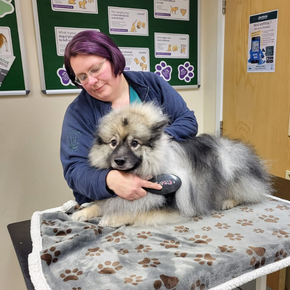
Vikki started in veterinary nursing in 1998 and then left to join the NHS. She returned to veterinary nursing in 2007 and qualified in 2010. Vikki enjoys running nurse consults and is one of our experienced consulting nurses. Vikki has a keen interest in nutrition, canine reproduction and weight management. She completed her certificate in Canine and Feline Veterinary Health Nutrition and became an Advanced Pet Health Counsellor in 2015 and gained a certificate in feline nursing in 2019. Vikki lives with her husband, son and three dogs (Keeshonds) whom she enjoys showing and has even entered Crufts a few times. In her spare time she enjoys crafting, reading, and baking
According to our nurse Vikki, grooming is great for your dog in many ways. Not only does grooming promote health in a variety of factors, it also helps to strengthen the bond between you and your dog.
Vikki has kindly shared the benefits of dog grooming below along with recommendations for different breeds and coat types. Have a read and see how a daily dog grooming routine is well worth your time!
Remember, if you have any queries on grooming, equipment, or your dog’s specific requirements, book an appointment with our vet nurses who can help.
Why should you groom your dog?
Our vet nurses advise that daily grooming will help you keep on top of your dog’s overall health and wellbeing. It will help you spot any areas for potential concern such as suspicious lumps and bumps, bald patches, flaky skin, or sores. You might also spot any pesky fleas or ticks nestled in the fur.
Grooming also promotes skin health; the motion of body brushing helping to increase circulation and promote natural oil production in the skin. This will, in turn, make your dog’s coat much healthier and naturally glossy.
Some long-haired dogs will also be prone to matting, especially after muddy winter walks in Wiltshire and Somerset and beyond. Daily grooming helps to remove these as soon as they start to knot, avoiding nasty and sometimes painful clumps.
Which dogs need grooming?
All dogs need grooming, according to Vikki!
- Dogs with thick coats benefit from daily brushing as they accumulate a lot of loose, dead hair and are prone to matting and collecting dirt and debris in their coat. Brushing helps to cleanse the coat and keep it healthy.
- Dogs with short, shedding coats such as beagles and dachshunds, won’t need the amount of grooming that a husky would need, but daily attention to their coat is still important for general wellbeing and to help you spot any potential problems.
- Dogs with wire coats like border terriers may not need day-to-day maintenance like other dogs, but regular brushing will help de-matt the fur and remove any debris or dead hairs resting on the skin. A brush made up of thin wires angled away from the skin is best. With these dogs, it’s wise to visit a professional groomer every few months for a hand strip; although they can be clipped, hand stripping is typically a gentle practice and preserves the health and condition of the coat. Our team may have recommendations of dog groomers in Wiltshire and Somerset, so do ask us!
- Dogs with wool-like coats such as cockapoos and poodles are often viewed as low maintenance from a grooming perspective because they shed less, if at all. However, these coats can get extremely matted very easily and need daily brushing to remove any slight build-up of knots. These dogs do benefit from professional clipping regularly as well.
- Grooming silky coats, like spaniels, can be tricky as their feathering, chest, and ears need daily brushing to keep matting away and the coat healthy and beautiful. The overall body coat also benefits from daily brushing but can be clipped either at home or professionally.
- Finally, dogs with double coats like retrievers and sheepdogs need daily brushing to keep tangles at bay. The difference with these dogs is that they should not be clipped unless specified by a veterinary professional.
More benefits of dog grooming
As we’ve discussed, there are benefits for all types of coats but it doesn’t stop there. Garston Vets’ nurses also advise that daily grooming helps you check your dog’s teeth, eyes, ears, and paws for any potential issues. You can look for anything lurking in the fur too like fleas and ticks, and you may notice unpleasant smells (usually in the mouth or ears) that indicate a problem.
Plus, research has found that grooming pets can have a calming and de-stressing effect on humans – so, grooming your dog is actually good for your health too!
If, while grooming your dog you come across anything that you think may be cause for concern, please don’t hesitate to call us for advice on 01373 452225 – you can find the rest of our contact details online.
If you would like to know more about grooming techniques and the kit most suited to your dog, our veterinary nurses are always happy to offer suggestions.

Senior Clinic Launch |
We were very excited to launch our NEW Senior Clinic launch night on Wednesday 1st February at The View, Westbury. Just under 100 clients attended the evening, with Garston staff presentations on dentistry, arthritis and cognitive dysfunction.
We are now delighted to be offering our Senior Clinics, led by our Registered Veterinary Consult Nurses, which are recommended ahead of your pet’s annual booster so that the results can then be discussed with the vet during their annual health check. The clinics are designed not to find issues with your senior pet, but to allow us to assess, evaluate and improve the quality of our patient’s lives. All results will be recorded all your pet’s health records, which allows us to monitor their overall health and wellbeing through to their geriatric years. To allow our team to monitor and support our patients’ senior years, we recommend a routine visit to our Senior Clinic annually.
These clinics will initially be offered at an introductory price of £39.00 (normal price £45.50) for a 60-minute consultation.
If any of the questions that we have asked in the survey have been answered with a yes, then we would recommend booking a Senior Clinic Consultation for your pet.
Book a senior clinic appointment now by calling your local surgery or contacting us on PetsApp.

New year brings new resolutions. One of those resolutions may be to try new things and get out more with your dog. In this article, our vet, Andy Woodward has identified the top 10 things to do with your dog in 2023.
9 things to do with your dog in 2023
- Visit a dog friendly beach in Somerset
- Try joining one of Charismatic Pets fun sports or activity classes
- Enjoy a fun, warm swim at a local hydrotherapy pool
- National Trust dog friendly walks and days out
- Enter the Battersea Muddy Dog Walk Challenge
- Take a walk (and quite possibly lunch) in The New Forest
- Try Paddleboarding together in Bradford on Avon
- Become a volunteer with Dogs for Health
- Book a long weekend break in a dog friendly cottage at one of the beautiful National Parks in the UK, like Andy and his Labrador Dave did.
There are many different activities and places to visit with your dog, some of them are completely free, while others may have a small fee.
Our vet Andy has chosen 9 activities that he thinks you might enjoy with your dog this year, including a link to a list of dog friendly beaches and hydrotherapy pools. Trying new challenges such as dog agility, paddle boarding or hoopers can really help stimulate your dog’s mind and body giving them new challenges from very energetic activities like agility through to the gentler activities such as hoopers or Scentwork training.
Just being in a new environment can have a huge impact not just physically but mentally also. Engaging their brain by introducing them to new activities and environments can have so many beneficial affects so why not make it a goal for 2023 to try new things.
Check your pet’s health
Before you do take on any new challenges however make sure your pet’s health is in good working order before pursuing an activity that may be difficult or put too much stress on them physically. Get in touch with our team to arrange a check-up.
If you have an older pet or one who struggles with strenuous activity then there are still ways to adapt the activities to suit them, whether it’s finding shorter easier walks or activities such as hoopers that are designed for those that struggle with impactful exercise.
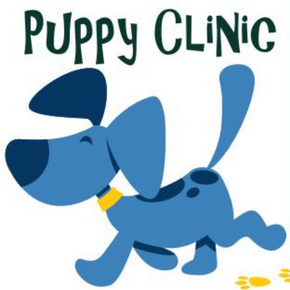
Our nursing team are delighted to be launching a NEW service in December 2022.
Learning about raising a well-rounded puppy is one of the most important factors of dog ownership. Why not come along to one of our puppy clinic presentations by Charis Vincent from Charismatic Pets for advice on:
• Establish clear communication with your puppy
• Socialisation
• Separation anxiety
• Integrating your puppy into family life
• Mouthing
• With plenty of opportunities for questions at the end
The session is open to clients and non-clients from pre-purchase to owners with puppies up to the age of 18 weeks.
The Puppy Clinic is held at our Westbury Surgery on a Monday evening. Please ask at reception for the next available session.
Attendance is £10 per person or FREE if on the Wellness Plan. This event is for ‘hoomans’ only and every attendee will receive a special goody bag to take home!


